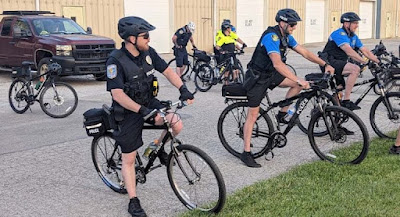In 2010, US cities had recently begun, or would begin, bicycle patrols. That year, Tiffin, an Ohio city near Toledo, paused theirs. I cannot find a reason why, but Officer Cadin Emshoff may have hinted at one. A patrol person on a bike is more approachable to community members on sunny days. But when it rains, not so much. On rainy days, he doesn’t ride. ‘“Done it once, not so fun, don’t think I’ll be doing it any time soon,” he explained.
Ironically, inclement weather is one reason why the bike patrol—which started in 1998–is re-starting. Recent storms have closed roads—to motor vehicles. Bicycles can, however, navigate many of those obstacles.
The usual reasons also are part of program’s revival: crowd control at events like the Fourth of July parade, access to parks, paths and other places inaccessible to cars and the aforementioned community relations.
In another irony, Emshoff is one of the two officers who will patrol on two wheels. Chris Perry will be the other. Their mounts will be the same two bikes that compromised the patrol’s fleet twenty-five years ago. Pauly acknowledged that the bikes are “old” but “we have babied those suckers.”



